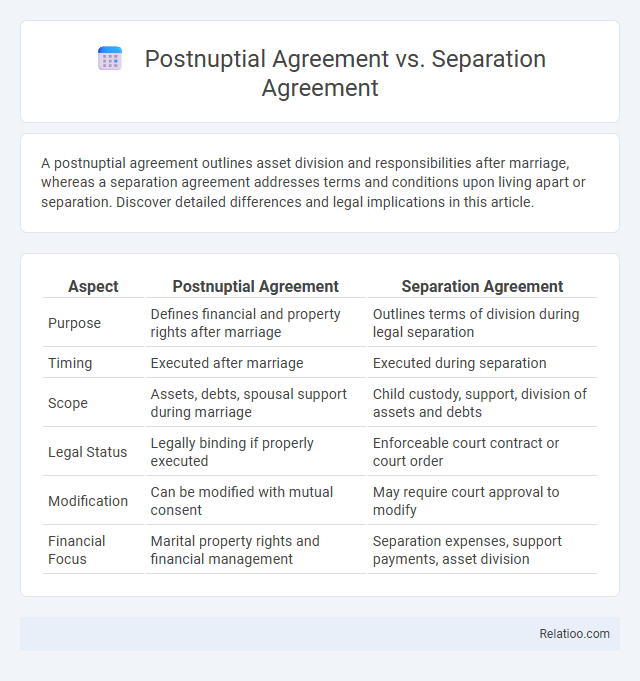A postnuptial agreement outlines asset division and responsibilities after marriage, whereas a separation agreement addresses terms and conditions upon living apart or separation. Discover detailed differences and legal implications in this article.
Table of Comparison
| Aspect | Postnuptial Agreement | Separation Agreement |
|---|---|---|
| Purpose | Defines financial and property rights after marriage | Outlines terms of division during legal separation |
| Timing | Executed after marriage | Executed during separation |
| Scope | Assets, debts, spousal support during marriage | Child custody, support, division of assets and debts |
| Legal Status | Legally binding if properly executed | Enforceable court contract or court order |
| Modification | Can be modified with mutual consent | May require court approval to modify |
| Financial Focus | Marital property rights and financial management | Separation expenses, support payments, asset division |
Introduction to Postnuptial and Separation Agreements
Postnuptial agreements and separation agreements serve distinct purposes in managing marital finances and responsibilities. A postnuptial agreement outlines the division of assets, debts, and spousal support during the marriage, ensuring clarity and protection for both parties. Your understanding of these legal tools is crucial for securing financial stability whether you choose to remain married or proceed toward separation.
Definition of Postnuptial Agreement
A postnuptial agreement is a legally binding contract created by spouses after marriage to outline the division of assets, responsibilities, and financial arrangements in case of divorce, separation, or death. Unlike a separation agreement, which formalizes terms for couples who are already living apart or intending to separate, the postnuptial agreement addresses potential future scenarios while the couple remains married. It differs from prenuptial agreements by being established after the marriage ceremony rather than before.
Definition of Separation Agreement
A Separation Agreement is a legally binding contract between spouses outlining terms for property division, child custody, support, and other issues following a separation. Unlike a Postnuptial Agreement, which is signed during marriage to plan future arrangements, the Separation Agreement specifically addresses the rights and responsibilities as the couple lives apart. Understanding the distinctions helps you protect your interests and ensure clarity during a separation or divorce process.
Key Differences Between Postnuptial and Separation Agreements
Postnuptial agreements primarily address the division of assets and financial responsibilities between spouses after marriage, often focusing on protecting individual property and outlining spousal support in case of divorce. Separation agreements govern the terms of physical separation, child custody, visitation rights, support payments, and division of marital property during or after the decision to live apart. The key difference lies in the timing and scope: postnuptial agreements are proactive contracts made during marriage to plan for potential future dissolution, while separation agreements are reactive legal documents executed once spouses have decided to separate.
Legal Purposes and Uses
Postnuptial agreements legally define asset division, debt responsibility, and spousal support after marriage to protect individual interests and avoid future disputes. Separation agreements establish terms for living arrangements, child custody, support, and property division during marital separation without divorce. Both documents serve distinct legal purposes: postnuptial agreements modify marital financial rights, while separation agreements formalize separation conditions before finalizing divorce or reconciliation.
When to Consider a Postnuptial Agreement
Consider a postnuptial agreement when significant financial changes occur during marriage, such as acquiring substantial assets or encountering debt. This legal document helps clarify property rights and financial responsibilities, offering protection and peace of mind. Unlike separation agreements, which address terms during marital separation, postnuptial agreements are crafted while the couple remains married.
When to Use a Separation Agreement
A Separation Agreement is used when spouses decide to live apart temporarily or permanently but have not finalized divorce proceedings, outlining terms related to finances, child custody, and property division during the separation. Postnuptial Agreements are signed after marriage to address future asset management or spousal support, often as a proactive measure or after changes in circumstances. Choosing a Separation Agreement is appropriate when couples seek legal clarity during a separation phase without dissolving the marriage immediately.
Enforceability and Legal Requirements
Postnuptial agreements are legally binding contracts made after marriage that outline asset division and spousal support, requiring full financial disclosure and voluntary consent to ensure enforceability. Separation agreements detail terms of marital separation, including child custody and property division, and must comply with state laws to be upheld by courts. Your choice between these agreements depends on specific circumstances and legal requirements, as enforceability varies based on proper drafting, agreement clarity, and adherence to jurisdictional standards.
Potential Benefits and Drawbacks
Postnuptial agreements provide clarity on asset division and financial responsibilities after marriage, offering protection for your individual interests but may face challenges in enforceability depending on jurisdiction. Separation agreements outline terms for couples living apart, including child custody and support, which can reduce conflict but require mutual consent to be effective. Understanding the potential benefits and drawbacks of each agreement ensures that you select the most suitable legal arrangement for your unique marital situation.
Choosing the Right Agreement for Your Situation
Choosing the right agreement for your situation depends on the specific legal and financial circumstances you face. A Postnuptial Agreement is designed to outline asset division and financial responsibilities after marriage, while a Separation Agreement formalizes terms of separation, including child custody, support, and property division without ending the marriage legally. Understanding differences between these and related contracts ensures tailored protection and clarity during marital transitions.

Infographic: Postnuptial Agreement vs Separation Agreement
 relatioo.com
relatioo.com